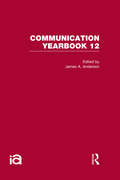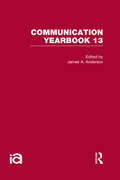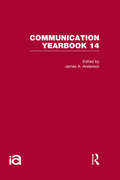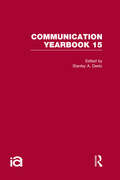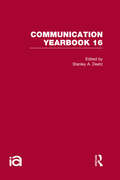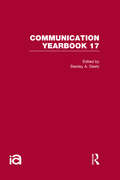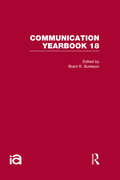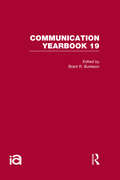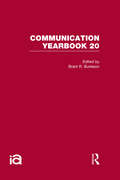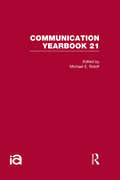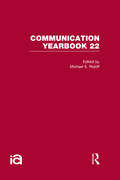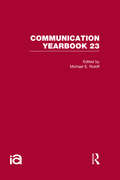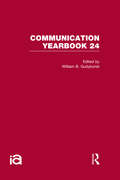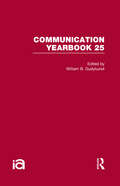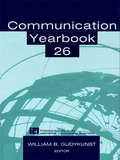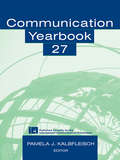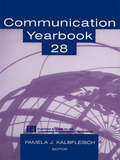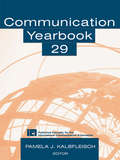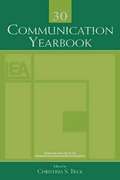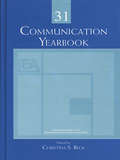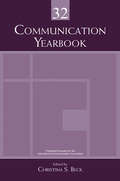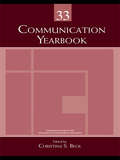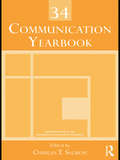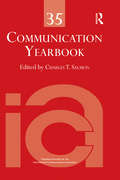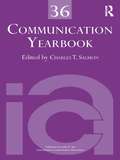- Table View
- List View
Communication Yearbook 12
by James A. AndersonFirst published in 2012. Routledge is an imprint of Taylor & Francis, an informa company.
Communication Yearbook 13
by James A. AndersonFirst published in 2012. Routledge is an imprint of Taylor & Francis, an informa company.
Communication Yearbook 14
by James A. AndersonCommunication Yearbook 14, originally published in 1991 delves into research concerned with: audiences - their effect on the mass media and how the mass media effect them; the quality of mass media performance and public opinion; the study of contemporary media from an organization studies approach; the implications of propoganda; the pressure of public opinion; and media agenda setting, among other issues. Commentaries provide refreshing viewpoints to each chapter, enhancing each chapter with complementary, or sometimes competing perspectives. Once again Anderson has brough together an internationally distinguished team of contributors who have created a forum for discussing cutting-edge topics in the field.
Communication Yearbook 15
by Stanley A. DeetzFirst published in 2012. Routledge is an imprint of Taylor & Francis, an informa company.
Communication Yearbook 16
by Stanley A. DeetzFirst published in 2012. Routledge is an imprint of Taylor & Francis, an informa company.
Communication Yearbook 17
by Stanley A. DeetzDivided into four sections, Communication Yearbook 17 focuses on interpersonal interaction, especially the constitutive processes within everyday communication, and is intended to complement the mass media focus of Communication Yearbooks 15 and 16. The second section focuses on message characteristics and what messages do in interaction. Section III considers value and policy issues in light of the ubiquitous nature of communication media and cultural pluralism. The final section discusses the future of communication studies and its potential social contribution. Commentaries on each chapter provide alternative perspectives ont he state of current research, extend issues of significance and help engage the reader in the contemporary debates of each area.
Communication Yearbook 18
by Brant R. Burleson Tammy Fletcher-BerglandCommunication Yearbook 18 originally published in 1995 focuses on cognitive approaches to the study of human communication, examining topics such as the formation of interaction goals, cognitive models of message production, mindfulness and minlessness in message processing and attention to televised messages. Sections two and three concentrate on the communicative management of health and environmental risks, critical analyses of classical approaches to risk communication and the ways in which people are connected through diverse forms of communicative behavior, including supportive relationships, electronic mail systems and ideologies. Commentaries in each section provide alternative perspectives on the state of research, extend issues of significance and help engage the reader with contemporary debates.
Communication Yearbook 19
by Brant R. BurlesonCommunication Yearbook 19, originally published in 1996 provides rich overviews of key developments in theory, method, and application. The volume contains ten integrative research revoews on diverse topics, including communication and the elderly, compliance gaining in organizations, interpersonal violence, communication technologies, media access and consumption ans well as three reviews addressing sex and gender issues.Each review synthesizes findings of past research, discusses current controversies and identifies challenges for future scholarship.
Communication Yearbook 20
by Brant R. Burleson Adrianne W. KunkelCommunication Yearbook 20, originally published in 1997 contains ten major reviews that collectively span the discipline. Two of the reviews examine how consumption of television programs affects viewers. Other media-related chapters examine sex-role stereotyping in advertising, the role of the public relations professional in the production of the news, and the nature and effects of public opinion. This collection also includes review articles addressing attitude change and persuasion, participation in decision-making groups, social anxiety, the development of social competence in childhood and cross-sex friendships across the lifespan. The chapters in this volume present summaries of relevant findings as well as penetrating discussions of theories, methods, problems and directions for future research.
Communication Yearbook 21 (Communication Yearbook Ser. #21)
by Michael E. RoloffCommunication Yearbook 21 reflects the rich diversity of the field of communication, both in terms of content areas and methods. The topics of the eleven reviews range from interpersonal influence to media practices and effects. The authors address issues such as organizational democracy and change, intercultural negotiation, journalism and broadcasting practices, the management off crisis and the relationship between media and the presidency. The volume was originally published in 1998. In addressing these issues, narratives, historical accounts and meta-analytic techniques are employed.
Communication Yearbook 22 (Communication Yearbook Ser. #22)
by Michael E. RoloffCommunication Yearbook 22 contains in-depth literature reviews focused on an important topic in specialized areas as well as syntheses that describe scholarship in other domains. Each chapter addresses an aspect of one of the most pressing issues currently facing individuals: how to communicate with people from different backgrounds or cultures. The first two chapters examine the ways sex differences and cross-cultural differences affect communication behavior. The following three chapters focus on harmful speech, the effects of pornography on criminal sexual offenders and personalization of conflict. Further chapters focus on argumentation, organizational settings and government/media relations as well as styles of customer service, communication within families with aging parents and intercultural friendship.
Communication Yearbook 23 (Communication Yearbook Ser. #23)
by Michael E. RoloffCommunication Yearbook 23, originally published in 2000 includes discussions about the relationship between communication and the emotional processes. The authors do not confine the reviews to research conducted in a single context, but instead draw upon scholarship that informs about shame and guilt in intimate, family, organizational and public discourse. Also explored is literature on compliance resistance and the emotional reactions that accompany resistance. Other reviews address issues involving communication about sexual harassment in the workplace, cross-cultural influences on management styles, and the mass media's role in encouraging change in body shape. Offering a tremendous variety of in-depth analyses of communication scholarship in a broad array of research areas, this is a vital sourcebook for researchers, teachers and students alike.
Communication Yearbook 24
by William B. GudykunstCommunication Yearbook 24, originally published in 2001 comprises essays that address the current status of theory and research in each division and interest group of the International Communication Association (ICA). It focusses on the following questions: What are the parameters of the division/interest group, and what is the relationship of the division within other groups? What are the major theories used, and what research is there to support these theories?What are the major lines of research, and what are the main issues with which scholars must cope in the twenty-first century?
Communication Yearbook 25
by William B. GudykunstCommunication Yearbook 25 is devoted to publishing state-of-the-art literature reviews in which authors critique and synthesize a body of communication research. This volume contains critical, integrative reviews of research on democracy and new communication technologies; the Federal Communication Commission's communication policymaking process; cognitive effects of hypermedia; mediation of children's television viewing; informatization, world systems, and developing countries; communication ethics; communication in culturally diverse work groups; and attitudes toward language. In addition, it also includes senior scholars' reviews of research on imagined interactions and symbolic convergence theory. Representing media, interpersonal, intercultural, and other areas of communication, this is an important reference on current research for scholars and students in the social sciences. Each of the chapters make a unique contribution to the field.
Communication Yearbook 26
by William B. GudykunstCommunication Yearbook 26 is devoted to publishing state-of-the-art literature reviews in which authors critique and synthesize a body of communication research. This volume continues the tradition of publishing critical, integrative reviews of specific lines of research. Chapters focus on comprehending speaker meaning; understanding family communication patterns and family functioning; affection in interpersonal relationships; audience activity and passivity; the political influence of business organizations in public policy. In addition, chapters discuss emotional intelligence in organizational communication; professionalism and social responsibility in the field of public relations; climate of opinion; ideology and the study of identity in interethnic communication; technology and the physician-patient relationship; and communication across the life span. Representing media, interpersonal, intercultural, and other areas of communication, this is an important reference on current research for scholars and students in the social sciences.
Communication Yearbook 27
by Pamela J. KalbfleischCommunication Yearbook 27 is devoted to publishing state-of-the-art literature reviews in which authors critique and synthesize a body of communication research. This volume continues the tradition of publishing critical, integrative reviews of specific lines of research. Chapters focus on an organizational communication challenge to the discourse of work and family research; recovering women's voice; empowerment and communication; participatory communication for social change; and the problematics of dialogue and power. In addition, chapters discuss the megaphone effect; the effects of television on group vitality; the empowerment of feminist scholarship in public relations and the building of a feminist paradigm; control, resistance, and empowerment in raced, gendered, and classed work contexts; credibility for the 21st century; and communicating disability.
Communication Yearbook 28
by Pamela J. KalbfleischCommunities are composed of connected individuals. The communication that exists within, about, and between these communities is at the heart of Communication Yearbook 28. This book draws from the broad range encompassed by the communication discipline to review literature that has something to say about community and what the communication discipline has to contribute to understanding this human connection.Offering state-of-the-art research, Communication Yearbook 28 presents:*an influence model addressing the most basic level of community--the personal relationship;*the literature on romantic and parent-child relationships at a distance;*community in terms of those working at home and telecommuting, running home-based businesses, and participating in online communities;*the communicative venue for community building and fragmentation;*social capital and tolerance;*the literature on collaboration, examining this communicative performance in community groups;*community as a foundation for the study of public relations theory and practice;*the visual images of community and what they suggest about these communities to those looking in from the outside;*the role new technology plays in maintaining community; and*community contexts.This book is an important reference on current research for scholars and students in the social sciences.
Communication Yearbook 29
by Pamela J. KalbfleischFor the past 55 years, the International Communication Association (ICA) has provided a venue for scholars and researchers to share ideas and findings in all aspects of the field of communication through its expanding publications program and its annual conference. The Association also works to increase visibility for communication scholarship and to foster research internationally.Communication Yearbook 29 centers on the theme of Communication and the Future. Authors in this volume address the future as they review 12 diverse areas of communication research. There have been many changes in the world, and this volume addresses questions such as: Has the discipline of communication kept up with change? Have we adapted to new technology and moved forward in our thinking? What do we as a discipline have to say about the future? Are there new areas in which we should be making a contribution? And are there new ways of looking at long-standing lines of communication research? The focus of this volume is on what we can do as communication scholars to make a difference in everyday life and in the future.Communication Yearbook 29 is an important reference for scholars and graduate students across the field of communication.
Communication Yearbook 30
by Christina S. BeckCommunication Yearbook 30 continues the tradition of publishing rich, state-of-the-discipline literature reviews. This volume offers insightful descriptions of research as well as reflections on the implications of those findings for other areas of the discipline. Editor Christina S. Beck presents a diverse, international selection of articles that highlight empirical and theoretical intersections in the communication discipline. Chapters in this volume include reviews of literature on gain-framed and loss-framed messages, conversational topic, organizational rhetoric, work-life research, collaboration, bullying, forgiveness, language revitalization, Latina/o representation in the media, and television viewing patterns of older adults. This volume will be valuable to scholars across the communication discipline. Communication Yearbook 30 will be particularly beneficial to scholars in the areas of interpersonal, health, organizational, family, and intercultural communication; language and social interaction, and media studies.
Communication Yearbook 31
by Christina S. BeckCommunication Yearbook 31 continues the tradition of publishing rich, state-of-the-discipline literature reviews. This volume offers insightful descriptions of research as well as reflections on the implications of those findings for other areas of the discipline. Editor Christina S. Beck presents a diverse, international selection of articles that highlight empirical and theoretical intersections in the communication discipline. Chapters in this volume include reviews of literature on silence in dispute, communicating about cancer, interpersonal conflict, trauma, identity, work relationships, communication and community, and media content diversity. This volume will be valuable to scholars across the communication discipline. Communication Yearbook 31 will be particularly beneficial to scholars in the areas of interpersonal, health, organizational, family, and intercultural communication; language and social interaction, and media studies.
Communication Yearbook 32
by Christina S. BeckThe Communication Yearbook annuals publish diverse, state-of-the-art literature reviews across the field of communication. Sponsored by the International Communication Association, volumes offer insightful descriptions of research as well as reflections on the implications of those findings for other areas of the discipline. Editor Christina S. Beck presents a diverse, international selection of articles that highlight empirical and theoretical intersections in the communication discipline.
Communication Yearbook 33
by Christina S. BeckThe Communication Yearbook annuals publish diverse, state-of-the-discipline literature reviews across the field of communication. Sponsored by the International Communication Association, volumes offer insightful descriptions of research as well as reflections on the implications of those findings for other areas of the discipline. Editor Christina S. Beck presents a diverse, international selection of articles that highlight empirical and theoretical intersections in the communication discipline.
Communication Yearbook 34
by Charles T. SalmonCommunication Yearbook 34 continues the tradition of publishing rich, state-of-the-discipline literature reviews. This volume offers insightful descriptions of communication research as well as reflections on the implications of those findings for other areas of the discipline. Editor Charles T. Salmon presents a volume with diverse chapters from scholars across the globe. Chapters cover a wide range of topics, including nanotechnology, deception, terror management theory, and the rhetorical aftermath of genocide. Commentaries from senior scholars round out the contents, providing insights on the groundbreaking work presented here. As a whole, this volume will be valuable to scholars and researchers across the communication discipline and around the world.
Communication Yearbook 35
by Charles T. SalmonCommunication Yearbook 34 continues the tradition of publishing state-of-the-discipline literature reviews and essays. Editor Charles T. Salmon presents a volume that is highly international and interdisciplinary in scope, with authors and chapters representing the broad global interests of the International Communication Association.The volume is organized into three sections, pertaining to interdisciplinary theory, normative ideals and political realities, and communication and societies in transition. Internationally renowned scholars serve as respondents for the three sections. With a blend of chapters emphasizing timely public policy concerns and enduring theoretical questions, this volume will be valuable to scholars throughout the discipline of communication studies.
Communication Yearbook 36
by Charles T. SalmonCommunication Yearbook 36 continues the tradition of publishing state-of-the-discipline literature reviews and essays. Editor Charles T. Salmon presents a volume that is highly international and interdisciplinary in scope, with authors and chapters representing the broad global interests of the International Communication Association. The contents include summaries of communication research programs that represent the most innovative work currently, with internationally renowned scholars serving as respondents to each chapter. Offering a blend of chapters emphasizing timely disciplinary concerns and enduring theoretical questions, this volume will be valuable to scholars throughout communication studies.
